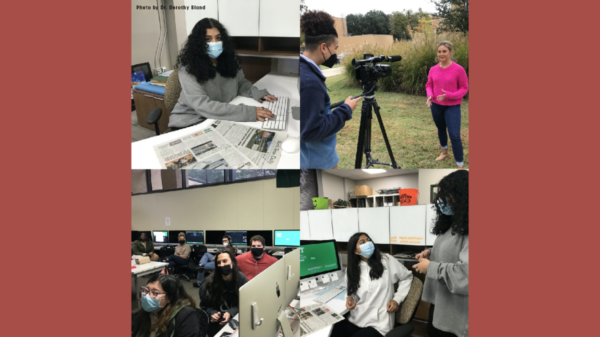By Valerie Fields Hill
Texas Metro News

Residents of two historically Black neighborhoods remembered an African American journalist during a ceremony last week as a kind and skilled writer who reported news and events in those communities when others did not.
Mitch Mitchell, a 21-year veteran social justice reporter at the Fort-Worth Star Telegram, was so often the only reporter who showed up to write news in Fort Worth’s Morningside and Como neighborhoods that he became a friend to residents living there, they said.
Mitchell died Oct. 1, 2020 after suffering a brief illness. He was 63.
“We’re here to celebrate one of us who was our best,” said the Rev. Kenneth Jones Jr., senior pastor of Como First Missionary Baptist Church, during the services honoring Mitchell.
Jones was keynote speaker during the observance. It was organized by members of New Mount Rose Baptist Church, a cornerstone congregation of the predominantly Black Morning-side neighborhood.
Earlier this year, Morningside church parishioners planned a remembrance service honoring Mitchell, but were forced to postpone it until last week due to inclement weather. Mitchell’s family held a funeral for the news reporter on Oct. 4, 2020.
Nearly 100 Como and Morning-side residents, Star-Telegram colleagues and Mitchell’s family members attended the service. The mid-morning event was held outdoors under a tent on a tree-lined lot adjacent to the New Mount Rose Baptist Church sanctuary.

Credit: Rev. Kyev Tatum
The remembrance service included a release of shiny blue mylar balloons, shaped like stars, and the dedication of a fig tree in remembrance of Mitchell. Attendees were treated to a luncheon.
Jones, the keynote speaker, challenged Fort Worth Star-Telegram executives and other Dallas-area media outlets to continue Mitchell’s community-based journalism by hiring reporters, editors and photographers who understand systemic racism and social injustices and who will uncover and report such issues.
“Mitch left us, but who’s next?” Jones asked. “We need our own voices to tell our own story.”
“We need our own media,” Jones continued. “But even in the mainstream media, we need diversity. Otherwise, we will only get the stories that feed the Jim Crow narrative.”
Mitchell’s passing leaves a void in equity on the D/FW newspaper, television, radio and online media landscape – the same imbalance that news and content outlets face across the nation.

According to the Pew Research Center, about 75 percent of newsroom employees across the country are non-Hispanic whites. By comparison, non-White Hispanics make up roughly 66 percent of all workers in the United States, the 2018 analysis concludes.
To address this issue, the American Society of Newspaper Editors set a goal “of minority employment by the year 2000 equivalent to the percentage of minority persons within the national population.” They failed to meet it.
Tatum said Mitchell nearly single handedly covered Fort Worth’s African American communities.
Star Telegram President and Editor Steve Coffman acknowledged Mitchell’s community-based coverage, saying the newspaper’s longtime political and restaurant columnist Bud Kennedy told him that he often used a search engine to research varied community topics, only to discover that Mitchell already had covered the issue.
“Bud Kennedy knew Mitch for a long time,” Coffman said at last week’s event. “When he did a Google search, Mitch’s was the only byline that showed up.”
Before his passing, Mitchell reported on a series of community meetings hosted by Tatum to address low life expectancy rates in the 76104 ZIP code where New Mount Rose is located.
According to recent data, the life expectancy rate of residents living in the 76104 ZIP code is 66.7 years – a dozen years shorter than the national average – and the shortest in the state.
More than 47 percent of the ZIP’s 17,400 residents are African American. The median income is about $22,200 a year. Many residents of the ZIP code do not have health insurance and heart disease is a major killer in the community, according to reports.

Credit: Valerie Fields Hill, Texas Metro News
Tatum, citing the important story, said that Mitchell was the only mainstream news writer to
attend the first meeting to address community solutions to the challenges.
“No other station covered it,” he said, before correcting himself and adding that a writer from LaVida News, a Black-owned local paper, joined Mitchell in reporting the alarming statistics and efforts to address social determinants contributing to the low life expectancy rates.
“Little did we know that this was going to be the last time that we would hug Mitchell,” Tatum said of that fateful meeting. Some audience members responded to the pastor with heavy breaths and sighs.
This week, a thread of Mitchell’s media coverage still was listed on the reporter’s Twitter page, @MitchMitchel3, which still is active, though no posts have been made to the page since Sept. 22, 2020.

Credit: Rev. Kyev Tatum
Mitchell also reported on Black Lives Matter protests, concerns of over-policing in Black communities, Alzheimer’s research among Mexican-Americans, hate crimes against Asian and Indian Americans at technology employers in Irving and assaults against women, among other areas.
Jones said Mitchell could cover such issues because he, like many prominent Black journalists, literary writers, poets and storytellers, had grown up in circumstances and communities that provided him with unique perspectives. The upbringing, Jones said, ultimately allowed Mitchell to relate comfortably to people who were different than himself.
Mitchell was born in Houston and attended Montessori school as an elementary student on the Texas Southern University campus, his sister said. He later graduated from the historically Black institution.

Mitchell’s formative years likely were influenced by articles he read in the Black Press, including the Houston Forward Times, because such publications were leading voices expressing concerns of Black people during a time when mainstream media did not routinely cover communities of color.
“Mitch was a product of Black journalism. He was the one to be proud of. He came from our own,” Jones said. “I didn’t know he was HBCU. I’m even prouder.”
Early in his journalism career, Mitchell owned his own newspaper, his sister said. He later worked at the Lufkin Daily News before joining the Star-Telegram in February 1999.
His sister Rosa Mendes said Mitchell was passionate about his work at the Star-Telegram. “Working there was what he wanted to do,” she said. “He found his sweet spot.”









You must be logged in to post a comment Login